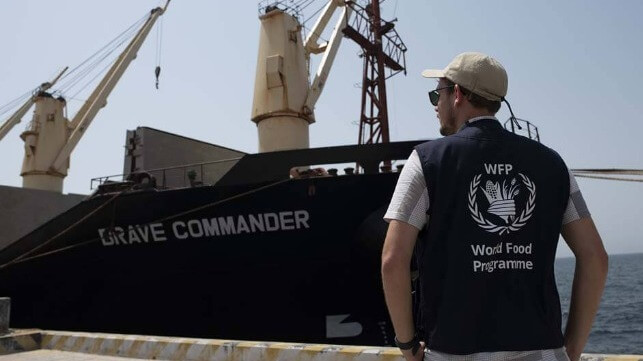Russia Rejects Compromise Proposal for Black Sea Grain Initiative

The government of Russia has rejected a compromise proposed by the European Union and has effectively pledged to withdraw from the Black Sea Grain Initiative, the agreement that secured a partial lifting of the Russian naval blockade on Ukraine.
In August 2022, facing pressure from developing nations and allies over its unwillingness to allow Ukraine to export grain, Russia agreed to allow bulkers carrying agricultural exports to transit from designated Ukrainian ports to the Bosporus, subject to strict conditions. Only designated ships would be allowed to make the voyage, and only if inspected by joint Russian/Ukrainian/Turkish/UN teams on both inbound and outbound transits. In practice, the inspection requirement has been used by Russian officials to limit the transit rate through procedural slowdowns, according to other participants.
In recent months, Russia has been less and less willing to participate in the daily functions of the grain agreement, and UN Secretary-General Antonio Guterres - who helped broker the deal last year - has expressed concern that Russia may exit. Ukrainian ambassador at large Olha Trofimtzeva puts the odds of Russian withdrawal at "99.9 percent."
Russia has issued several demands in exchange for allowing Ukrainian grain to flow outbound by sea. These include the resumption of ammonia exports via a Ukrainian pipeline; increased sale of Russian ag exports; and the re-connection of the sanctioned Russian Agricultural Bank to the SWIFT global interbank payment system. The bank (also known as Rosselkhozbank) is Kremlin-owned and subject to EU and U.S. sanctions, but the EU has proposed allowing it to set up a subsidiary exclusively for grain exports. According to the Financial Times, this subsidiary would be allowed to connect to SWIFT - if Russia renewed participation in the grain initiative.
On Tuesday, Russian Foreign Ministry spokesperson Maria Zakharova told Reuters that the proposed subsidiary was a non-starter, and that only reconnecting Rosselkhozbank itself to SWIFT would be enough. She added that a parallel proposal to create a dedicated payment channel from Rosselkhozbank to a single U.S. bank would not work for the Kremlin. "There is no real replacement for SWIFT, and cannot be," she said.
The failure of this plan brings Russia one step closer to withdrawing from the deal. To confirm the likelihood of an exit, the Russian foreign ministry said Tuesday that it was "obvious there are no grounds" to allow Ukrainian grain exports by sea beyond July 17.

that matters most
Get the latest maritime news delivered to your inbox daily.
Whether or not Moscow decides to formally end its role in the initiative, it has already brought the grain corridor to a virtual shutdown through noncooperation. Russia's inspection team in Istanbul has slowed cargo movement down to one or two vessels a day (and on some days, none at all). Ukraine is actively preparing to move a larger share of the upcoming harvest through its Danube River inland ports, which remain unaffected.
An end of the grain corridor would also have no effect on non-grain cargoes to and from Ukraine's Black Sea coast. Vehicles, containerized freight, breakbulk, petroleum and ro/pax operations have all been blocked by Russian embargo throughout the period of the grain initiative.
